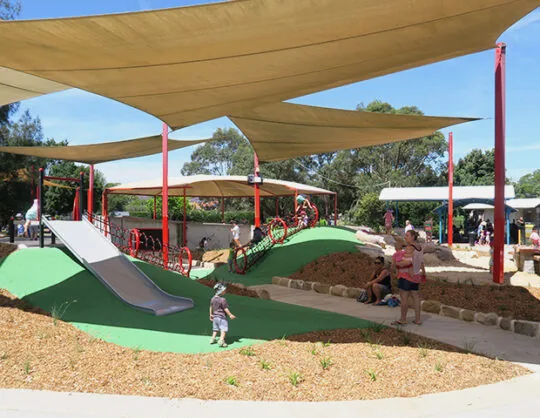How To Help Your Screaming Child


Written by Dr Kaylene Henderson, Child Psychiatrist and Parenting Expert
I’m sure you’ve witnessed a screaming child who has felt completely out of control.
Okay, okay… let’s be honest, chances are, it hasn’t been A child; it’s been YOUR child having a meltdown.
(Although admittedly if it’s ever happened in the supermarket, you might have been tempted to pretend they were someone else’s child…)
It’s like watching an internal tornado gain intensity and wreak havoc within your little one rendering them hysterical. Sometimes there’s a build up, at other times the emotional storm seems to blow in without warning, leaving your child suddenly unresponsive to logic or reasoning. I describe it like this, not just because this is how it appears, but because, clouded by our own horror, we can lose sight of what this experience must be like for our little one as they’re swept up by a mini-tornado-for-one – completely terrifying. And just as you would never expect a child caught up in a powerful tornado to be able to ‘calm themselves down’, a young child with overwhelming emotions finds it distressingly impossible too.
The reason for this is that the ability to calm down from strong emotional states (formally known as ’emotional regulation’) requires the development of specific brain pathways which actually take years to establish.
We know that when a child learns to talk, they first utter sounds before full words and later sentences.
Similarly, the capacity for emotional regulation develops in stages too.
Stages of emotional regulation:
- Initially you need to calm your baby’s distress for them by doing things like holding them close, patting, rocking etc.
- Later, your child will have a higher threshold for coping with their feelings, but they will still regularly need your help to calm down from big feeling states (we call this ‘co-regulation’ of emotions)
- Finally your child can manage their feelings on their own (this is called self-regulation of emotions)
In reality, even as adults we might move between these last two stages depending on how well we’re coping at the time and how stressful the trigger is. This means that most of the time we can calm ourselves down, but occasionally we might still feel overwhelmed and need to turn to those close to us for comfort.
So, assuming your young child hasn’t yet mastered how to calm down from big feeling states, what can you do when they’re ‘losing it’ or having a ‘meltdown’?
Of course, in an ideal world we would be able to predict and prevent meltdowns before they happen. Once your child’s feelings overwhelm them however, try the following approach –
Top Tips For Managing Meltdowns:
- Firstly, take a deep, calming breath. Remind yourself that your screaming child is out of control and needs your help to deal with more than their brain is wired to handle.
- Stay with your child. Sometimes parents send their young child to ‘time-out’ with the instruction to calm themselves down. Not only is this a neurologically impossible task but this rejection often makes the child feel more upset so their distressed state lasts for longer. Your child needs lots of help from you ‘co-regulating’ their emotions before they can learn to manage their feelings on their own. We call this approach ‘time-in’ rather than ‘time-out’.
- Save talking until later. Children cannot concentrate on your words while they’re still upset – that’s not how their brains are wired – so keep talking to a minimum. Simply say in a calm, reassuring tone, “You’re really upset. I’ll help you calm down. Let’s slow our breathing down, cuddle in and we’ll figure the rest out later”.
- Breathe with your child. Show them how to take slow, deep breaths. If they try to shout or scream about their plight, simply reassure them that you’ll listen to what they have to say after you’ve helped them calm down.
- Debrief. Once your child is calm, it’s useful to have a quick chat about what just happened. You can start the conversation by saying “Gee, you must have felt really angry then. You did a good job calming down but I wonder what we could have done instead so that you didn’t get so upset in the first place”. Listen to your child but be firm with your limits. “I understand that you felt angry because your sister grabbed the toy you were playing with, but what might be a better way to ask for your toy back next time?”
Children need to learn how to manage tricky situations, but they can only do this once they’re feeling calm, so save your teaching until they’re wired to learn.
When we stay with our children and help to co-regulate their big feelings we teach them that emotions, however intense, are manageable. And just as importantly, we teach our kids that they can rely on us to be their go-to-person when they feel like they’re losing their grip. Even in the supermarket.
Dr Kaylene Henderson is a highly trained, Infant, Child and Adolescent Psychiatrist, one of Australia’s leading parenting experts and a grateful mother of three. She is also a trusted professional development provider for the early childhood education sector and a sought after media contributor and conference speaker.
In her warm and relatable style, Kaylene shares practical, research based advice with parents and professionals alike in the hope that together, we can bring out the best in the children for whom we all care.
For more great reading:
2 Easy Ways To Support Mindfulness in Toddlers
How Does Preschool/Kindergarten in a long daycare setting differ?
Only About Children can help your child to grow, make friends and explore the world.
Only About Children can help your child to grow, make friends and explore the world.
Related Reads


The Best Family-Friendly Inner West Dining & Restaurants
Sydney’s Inner West is blessed with an abundance of outstanding places to eat out, and as local childcare experts with seven campuses across the area, we are passionate about finding local spots that are perfect for families.

The Best Playgrounds In The Inner West, Voted By Our Childcare Experts
With seven Only About Children campuses across Sydney’s Inner West, our team knows where to find the best local playgrounds for families. We’ve selected the best playgrounds in the Inner West offering fun play equipment, family-friendly facilities, and – of course – where to find a great coffee!
